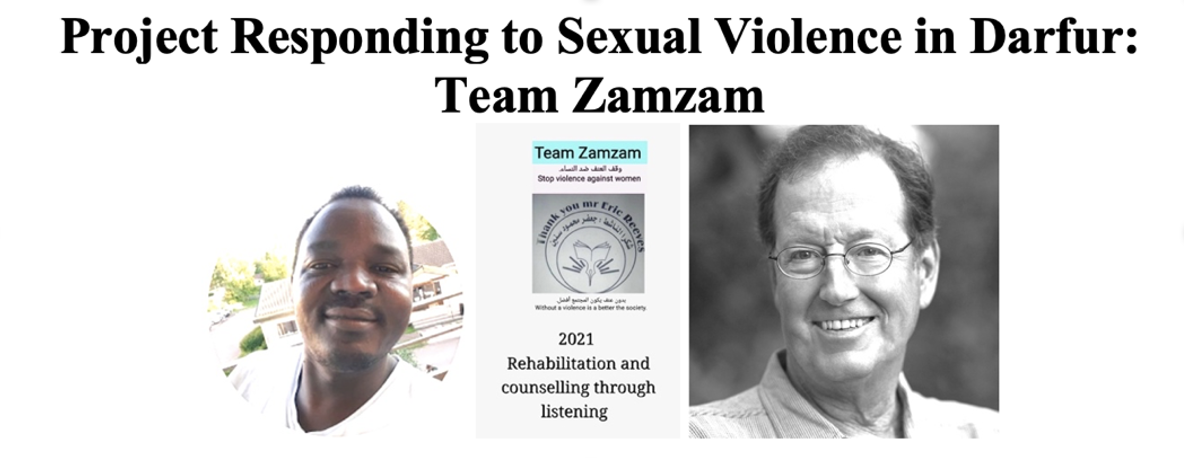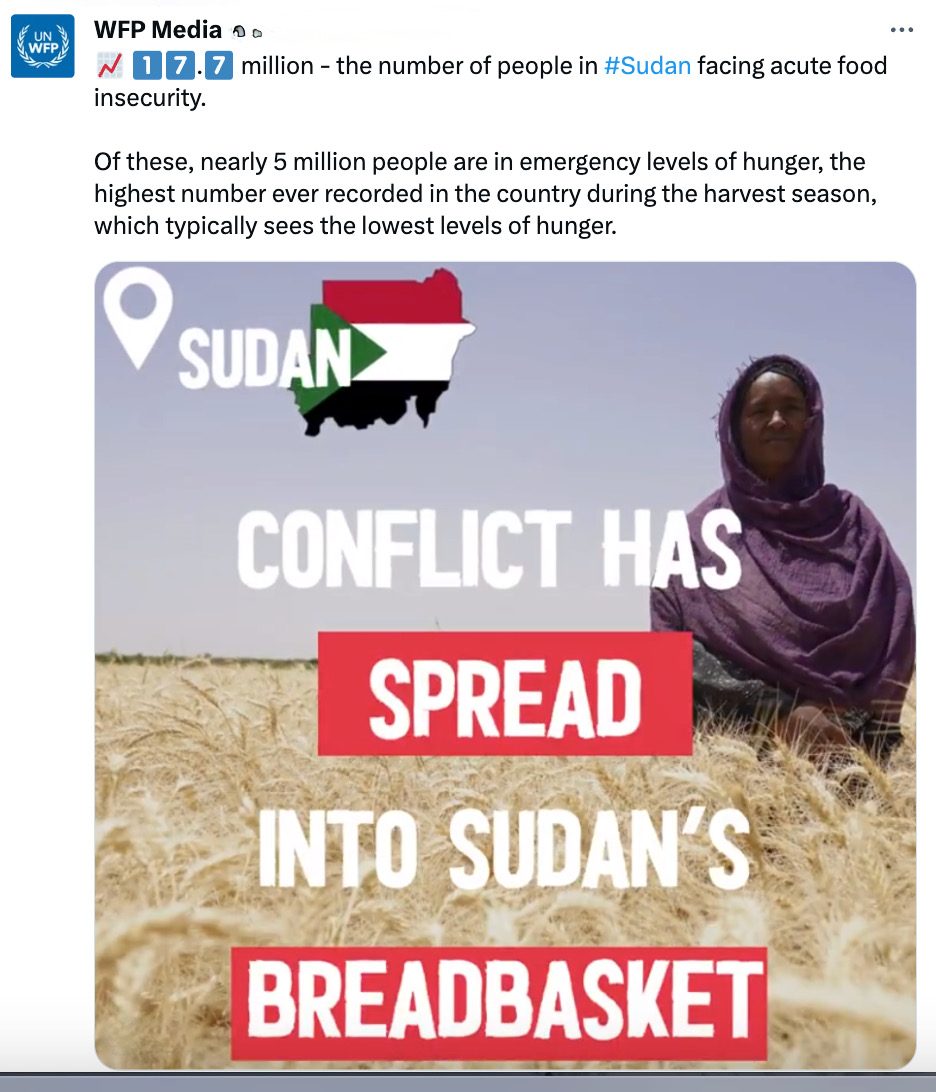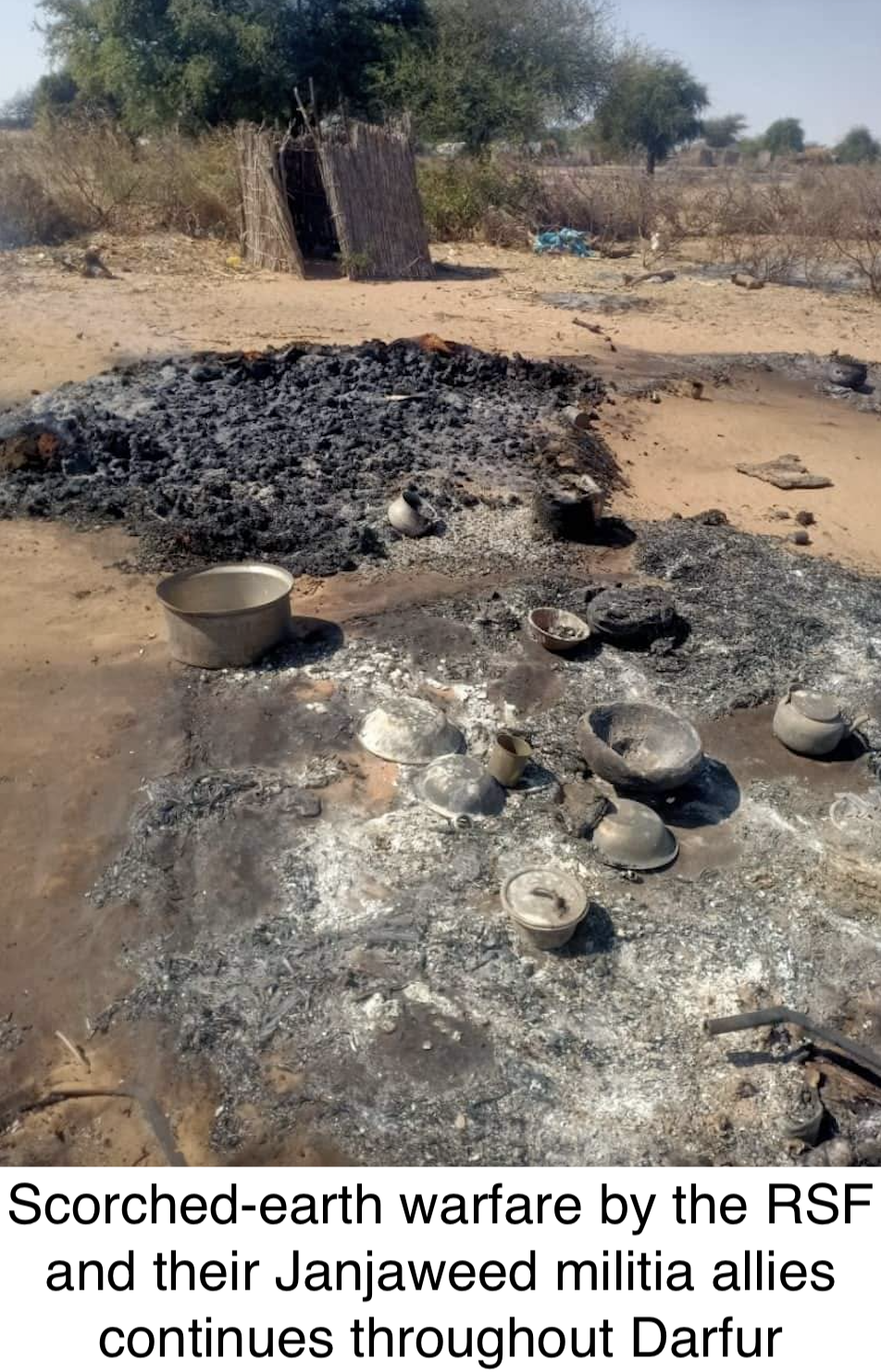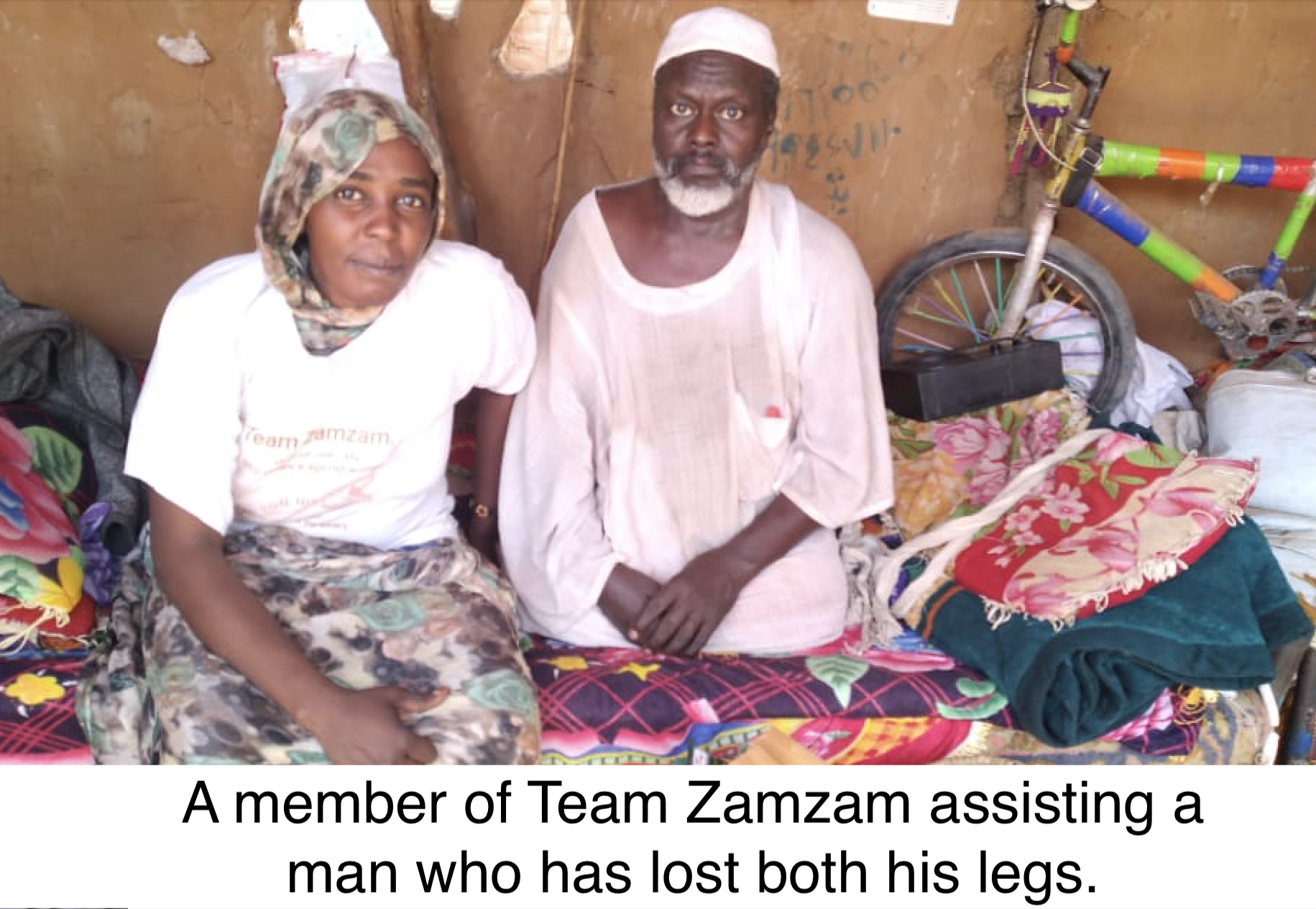
 Gaffar Mohammud Saeneen and Eric Reeves, Co-Chairs
Gaffar Mohammud Saeneen and Eric Reeves, Co-Chairs
Nancy Reeves, Editor and Funding Advisor; Julie Darcq, Online Campaign Coordinator
Overview (Eric):
Sudan continues to suffer—silently, invisibly, and amidst tremendous human and physical destruction. Sudan may very well disintegrate as a state, in the modern sense of the word. The violence that began in April with the attack of the Rapid Support Forces (RSF) on the headquarters of the Sudan Armed Forces (SAF) continues to metastasize and has now spread to Al Gezira state and its capital, Wad Madani. Hundreds of thousands of people have fled Khartoum for Sudan’s second largest city, lying in the heart of the country’s agricultural region. This assault on Wad Madani by the RSF will be enormously consequential, as much of Sudan already suffers from extreme hunger and food insecurity.
The UN’s World Health Organization gave a sense of how grave the situation has become just two days ago:
“Nearly 5 million people are in emergency levels of hunger”—the majority of these are children, many of whom suffer Severe Acute Malnutrition (SAM) and will die without therapeutic feeding. But the overall census—“17.7 million…the number of people in Sudan facing acute insecurity”—clearly portends famine in many regions and locales during the months ahead. This is normally the time of year when food security is best; but failed agricultural seasons in many states (especially Darfur), the larger collapse of the agricultural sector (a primary legacy of the al-Bashir kleptocracy), and the absence of secure routes for humanitarian convoys carrying food and medicine from east to west ensures that catastrophe is bearing down on Sudan.
Although both the Sudan Armed Forces (SAF, led by General Abdel Fattah al-Burhan) and the Rapid Security Forces militia (RSF, led by génocidaire Hamdan Dagalo, aka “Hemeti”) bear major responsibility for a wide range of atrocity crimes, it is the RSF that is doing most to create the insecurity that prevents humanitarian aid from moving from Port Sudan on the Red Sea to Darfur and the Kordofan states. The sheer viciousness, depravity, and cruelty in evidence country-wide are also the primary responsibility of the RSF. Notably, the United Arab Emirates (UAE) have thrown their very considerable support to the RSF, and yet the United States has consistently failed to hold this small, petro-rich Gulf State to meaningful account. This explains much of the RSF’s success, particularly in Darfur where the RSF emerged under Hemeti’s leadership in 2013, tasked with completing the genocide begun in the region in 2003.
Attacks on medical and health facilities—again throughout the country—have continued to expand in the more than eight months of immensely destructive and indiscriminate violence. Here again, while both sides share blame for these war crimes, the RSF are primarily responsible.
Despite being the national army, the SAF under General al-Burhan has performed terribly in confronting the RSF, often retreating for no reason other than cowardice and poor officer leadership (the traditional officer corps of the SAF was ruthlessly purged by the al-Bashir regime). This leaves many hundreds of thousands of non-combatant Sudanese civilians at the mercy of the RSF’s barbaric predations.
There is no end to the fighting in sight, and neither al-Burhan nor Hemedti can be trusted to abide by any meaningful agreement to end the fighting. They care nothing for the people of Sudan—only the power and wealth that would come with “victory.” But this will perforce be a “Pyrrhic Victory,” given the level of destruction in Khartoum, the capital city, and the broader destruction of so much of the country’s critical infrastructure.
The chances only grow that Sudan will devolve into a disintegrating state, with no real central authority—and no ability to control bad actors from within or without Sudan. The country could, in short, be a vast new “Somalia” in the heart of Africa, bordering seven countries, all of them with serious problems. This is fertile ground for international terrorism.
A Beacon
If we turn to North Darfur, and El Fasher in particular, we see at present an island of relative security. A combination of motivated SAF forces (with an uncharacteristically large non-Arab Zaghawa make-up), units from two important Darfuri rebel groups that were signatories to the ill-fated “Juba Peace Agreement” (October 2020), and a growing “citizens militia” have managed not only to hold off an intense RSF assault, but have pushed the RSF and Janjaweed forces further and further from the city itself. The security thus provided has enabled trickles of food and other supplies to reach El Fasher from non-traditional routes, not requiring transport from Port Sudan, some 1,000 miles away.
There is more food in the main market in El Fasher, and the market has resumed nearly normal hours. There is more medicine, and the unsettling prospect of uncontrolled violence has receded. Nonetheless, inflation in food prices remains extremely high; even with a substantial contribution from a project donor that has created a fund for large additional food distributions, Team Zamzam struggles both to acquire and distribute food (see the ANNEX from the Team’s coordinating counselor, the basis for this month’s update). Their efforts, nonetheless, have managed to assist hundreds of the most destitute and needy families in Zamzam. They have also continued to provide escort services for seriously ill and injured individuals to hospitals and clinics in El Fasher; they provide pre-operative and post-operative care for the three fistula cases our monthly budget permits; and they conduct constant assessment missions throughout Zamzam, and meet with other important camp actors and groups.
The work of Team Zamzam has also attracted a significant cohort of volunteers who are never without work.
In addition to food insecurity and the constant threat of violence, what emerges most clearly from the ANNEX is the need for additional water supplies. The rainy season has ended and the ability to store clean water is extremely limited. Drinking unclean water, and living in such close quarters, camp residents—especially those most recently displaced—are prey to any number of diseases, a development exacerbated by the lack of shelter during these colder winter months. Our project has to date rehabilitated six non-functioning wells—left in ill-repair when international humanitarian organizations withdrew from Darfur—and in January we hope to repair a seventh. But the process is expensive, given how long the wells have received little or no maintenance. And yet again, the most vulnerable to shortages of clean water are those newly displaced by RSF violence, people who often end up in shelters only adjacent to Zamzam itself.
Centrally, Team Zamzam continues its work with girls and women traumatized by sexual violence perpetrated by the RSF and their Janjaweed militia allies. For the one grim constant near Zamzam and other IDP camps is the threat of brutal sexual violence. At this point, three and a half years into the life of the project, almost 100 girls and women have received life-saving or life-transforming fistula reparative surgery—rescuing them from lives of agonizing pain, deep shame, and social ostracization growing out of ignorance of how traumatic fistulas are caused. One such case is highlighted in the coordinating counselor’s monthly report.
An archive of previous reports from Team Zamzam’s coordinating counselor may be found here.
How to Help
Assistance is urgently needed and will be greatly appreciated by Team Zamzam, and by the girls and women whose suffering they seek to alleviate. The distribution of food and medicine presently comes as many within the camp daily move closer to starvation. Here I should also stress the tremendous efficiencies of purchases by a staff with local knowledge, as well as the value of their deep understanding of where need is greatest within this vast camp, swollen with recent displacements caused by insecurity.
NB: It is now possible to make a tax-deductible contribution to our project, using a portal on the website of a 501/c/3 organization operating in Sudan. Operation Broken Silence, working primarily on health and education issues in the Nuba Mountains of South Kordofan, has created a special site for a tax-deductible contributions to our project, and we hope this makes contributing to the health and well-being of girls and women in Zamzam easier for donors.
We also hope that all will keep in mind our project as a whole operates with truly extraordinary efficiency, in ways matched by no humanitarian organization operating in Darfur that I am aware of, a region I have been researching for two decades. There is absolutely no overhead for this project.
Those wishing to assist in funding the work of Team Zamzam may also send a check directly to Eric (Eric Reeves, 31 Franklin St., Northampton, MA 01060)
or
Purchase one of his woodturnings: https://www.ericreeves-woodturner.com/gallery
100% of the purchase price of every woodturning directly supports the project in Zamzam.
*******************
Previous updates are archived at: https://www.ericreeves-woodturner.com/blog/
A “You Tube” video of Eric describing the project can be found at: https://youtu.be/QsRUa7GoVgY





